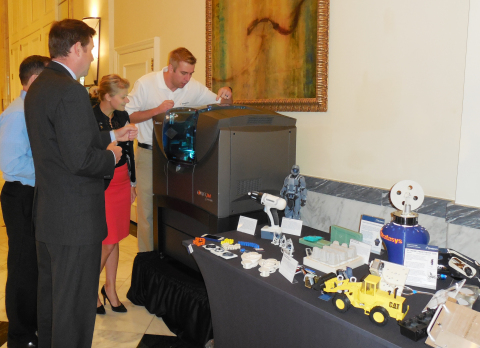Manufacturers and Industry Groups Today Celebrate National Manufacturing Day Through Events Showcasing U.S. Manufacturing Capabilities
MINNEAPOLIS & REHOVOT, Israel — (BUSINESS WIRE) — October 4, 2013 — Manufacturing using 3D printing technologies holds significant promise in strengthening U.S. manufacturing competitiveness by transforming how many products are made and increasing supply chain efficiencies, according to Stratasys (Nasdaq: SSYS), a manufacturer of 3D printers and materials for personal use, prototyping and production.

Attendees view a demonstration of Stratasys 3D printers at NAM board meeting in Washington D.C. (Photo: Business Wire)
However, Stratasys also noted that industry, government, and academia need to continue collaboration across key areas to help realize the potential economic impact from accelerated use of additive manufacturing. These include efforts to educate industry on the viability of existing and developmental 3D printing technologies, and strengthen STEM education to prepare the workforce of tomorrow.
Stratasys provided a demonstration of 3D printing technology at the National Association of Manufacturers (NAM) annual board meeting in Washington D.C. on Wednesday, Oct. 2. And both Stratasys and NAM agree that current economic conditions may enable additive manufacturing to scale up and drive significant economic impact.
“Additive manufacturing or 3D printing can fundamentally change many aspects of the manufacturing process,” says Stratasys CEO David Reis. “It brings new agility and efficiency and can help manufacturers keep production at home. It is imperative that 3D printing technology providers, manufacturers, universities and government work together to help fulfill the promise of this impressive and impactful technology and strengthen our economy and manufacturing. Stratasys is actively working to that end.”
The theme of US manufacturing competitiveness and innovation was echoed around the country today as hundreds of manufacturers and industry groups recognized National Manufacturing Day by hosting events to showcase U.S. manufacturing capabilities and the future of the 3D printing industry.
“Additive manufacturing technology is becoming more and more accessible, and poised to usher in an era of new opportunity for manufacturers in the U.S.,” says Jay Timmons, president and CEO of the National Association of Manufacturers. “Manufacturing is at the center of our national conversation, and it is innovation and technological advancement that will keep it there.”
According to Lux Research in its recent report “ Building the Future: Assessing 3D Printing’s Opportunities and Challenges,” 3D printed parts will be an $8.4 billion global market in 2025 led by the automotive, medical, and aerospace industries. Stratasys believes that greater industry awareness of 3D printers’ capabilities, advancements in materials, and increasing affordability will play a significant role in driving this growth.
“Many talk about additive manufacturing as a ‘disruptive’ technology, but these are the same production materials that many engineers and manufacturers are already used to working with,” says Jon Cobb, EVP of Global Marketing for Stratasys. “In our view, additive manufacturing will not replace many of the traditional manufacturing processes, but rather complement how a good portion of manufacturers are delivering products to market in a more efficient and customized way.”
Impacting Our Economy through Additive
Manufacturing
Stratasys believes that the additive
manufacturing opportunity is now. For more than 25 years, many
manufacturers in aerospace, automotive, defense, education, consumer
goods and electronics, biomedical and other industries have used
Stratasys additive manufacturing systems to make product designs better.
But today, more and more customers are using 3D printing to produce
finished complex goods on-demand in an efficient process using common
thermoplastics. This growing manufacturing method is impacting many
areas of the economy by empowering manufacturers to be more efficient,
flexible and innovative. Those who apply such technologies could gain
competitive edge.
The National Additive Manufacturing Innovation Institute ( NAMII), an advanced manufacturing hub that brings together industry, academia and government to accelerate innovation and advance emerging manufacturing technologies, recently funded its first research projects including three that employ the Stratasys FDM process using high-temperature ULTEM™ 9085 thermoplastic resin. The projects are designed to help bridge the gap between basic research and product development, provide shared assets to give companies — particularly small manufacturers — better access to cutting-edge capabilities and equipment, and create an unparalleled environment to educate and train students and workers in advanced manufacturing skills.
Stratasys is also working with the U.S. Department of Energy at Oak Ridge National Laboratory (ORNL) to develop additive manufacturing processes for production use. The initiative builds upon a strong collaboration that leverages ORNL's Manufacturing Demonstration Facility (MDF) to foster energy efficient production using additive manufacturing materials and processes.
Future Workforce
As additive
manufacturing gains momentum, the evolving skill sets required to use it
heightens the need for investment in STEM education. This will allow the
workforce of tomorrow to participate more fully in the new economy and
help shape industry. For years, Stratasys has worked with numerous
research-driven universities and thousands of K-12 schools to help
students strengthen technical skills by using 3D printers.

